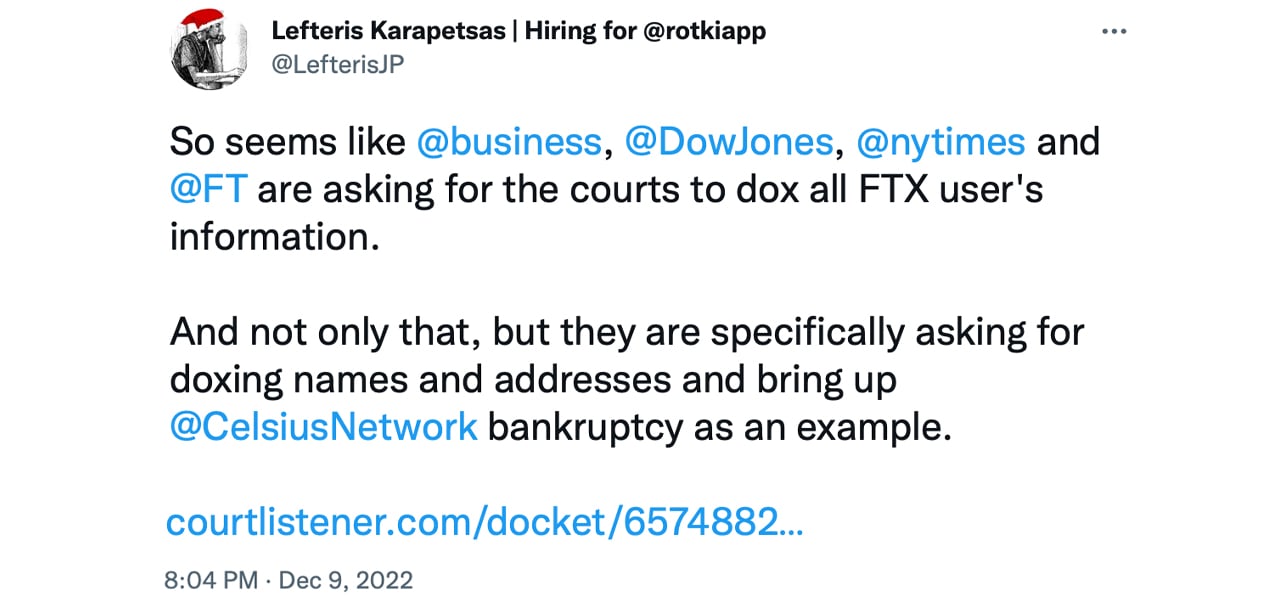Amid the ongoing FTX bankruptcy proceedings, court documents indicate that media firms such as Bloomberg, the New York Times (NYT), Dow Jones & Company, and the Financial Times (FT) want the redacted information tied to FTX creditors unsealed. The media companies believe the public should be made aware of the creditors’ information, as the publications stressed in the court filing that the “news media acts as the eyes and ears of the public.”
Four major news media publications have filed a document with the Chapter 11 bankruptcy case tied to the now-defunct FTX cryptocurrency exchange. Essentially, the publications call themselves “media intervenors” and the intervenors “object to the continued sealing and redaction of information that historically has been quintessentially public in nature.” The four media outlets include the Financial Times (FT), the New York Times (NYT), Bloomberg, and Dow Jones & Company.

The so-called “media intervenors” cite a specific rule that permits “any interested entity” to intervene in a bankruptcy matter and “with respect to any specified matter.” The publications also says that the courts have “routinely recognized the right of the media” to “intervene” or “challenge sealing orders.” The filing adds:
The news media acts as the eyes and ears of the public, informing the public of issues of the day. This valuable social function is hampered by sealing of judicial records.
Despite the debtor’s objections to keep the customer list in strict confidence, and the reasoning that says the dissemination of the debtors’ customer list could cause harm to the clients, the “media intervenors” call these arguments “vague statements” that “do not appear to satisfy the evidentiary burden.” Bloomberg, FT, NYT, and the Dow media firms insist that “redacting the names of creditors is inappropriate.” The court filing continues:
While redaction of contact information arguably may be justified in some circumstances to prevent identity theft and harassment, releasing the names of the creditors neither exposes the creditors to risk of identity theft nor to personal danger. It also does not create undue risk of unlawful injury.
Additionally, the Celsius bankruptcy case is highlighted by the media firms in the court filing. In that specific case, the bankruptcy court published 14,000 pages of Celsius customer usernames and trade histories. After the court did this to Celsius users, it caused quite a bit of public outcry. “This Celsius dox is one of the [most] egregious privacy violations in crypto history,” one individual wrote at the time. The news also follows the public denouncing mainstream media publications on several occasions for doxxing people.
In recent times, the Washington Post’s reporter, Taylor Lorenz, was blasted in mid-April for reportedly doxxing the Libs of Tiktok creator. Four years ago mainstream media publications like the NYT said that doxxing has become “a mainstream tool in the culture wars.” The report notes that “identifying extremist activists and revealing their personal information has become a bit of a sport on the internet.”
Years later, the establishment’s media has been accused of leveraging the doxxing tool and using the controversial tool for clicks, publicity, and notoriety. When Newsweek columnist Leah McGrath Goodman published a report in March 2014, the reporter was slammed for doxxing Dorian Nakamoto’s California address. It was found that Dorian was not Satoshi Nakamoto and he said the reporter treated him unfairly.
As far as the FTX bankruptcy case is concerned, Redditors from the forum r/cryptocurrency lambasted Bloomberg, FT, NYT, and the Dow media firms for attempting to dox customers associated with the fallen exchange. In the forum discussion, Redditors also talked about how a number of publications like the New York Times published puff pieces on the FTX co-founder Sam Bankman-Fried.
“Never expected anything better by the media. It’s just all about the money for them and 0% about the truth,” one individual wrote. “Sadly way too many still trust them.” Another person added:
Mainstream media are paid actors.
Despite the most recent public outcry against the Celsius dox, the so-called “media intervenors” do not mention that part of the story, even though it was quite evident the public was not pleased with the bankruptcy court’s decision.
“Redacting the names of the creditors will have far-reaching impact as the case progresses,” the media publications note in the FTX bankruptcy court filing. “This court has routinely authorized debtors in other Chapter 11 cases to file under seal confidential information,” the filing concludes.
What do you think about Bloomberg, FT, NYT, and the Dow media firms attempting to get FTX’s creditors’ list unredacted? Let us know what you think about this subject in the comments section below.
Jamie Redman is the News Lead at Bitcoin.com News and a financial tech journalist living in Florida. Redman has been an active member of the cryptocurrency community since 2011. He has a passion for Bitcoin, open-source code, and decentralized applications. Since September 2015, Redman has written more than 6,000 articles for Bitcoin.com News about the disruptive protocols emerging today.
Image Credits: Shutterstock, Pixabay, Wiki Commons
Disclaimer: This article is for informational purposes only. It is not a direct offer or solicitation of an offer to buy or sell, or a recommendation or endorsement of any products, services, or companies. Bitcoin.com does not provide investment, tax, legal, or accounting advice. Neither the company nor the author is responsible, directly or indirectly, for any damage or loss caused or alleged to be caused by or in connection with the use of or reliance on any content, goods or services mentioned in this article.
Ripple CEO: SEC Lawsuit Over XRP 'Has Gone Exceedingly Well'
The CEO of Ripple Labs says that the lawsuit brought by the U.S. Securities and Exchange Commission (SEC) against him and his company over XRP "has gone exceedingly well." He stressed: "This case is important, not just for Ripple, it’s ... read more.
Amid the ongoing FTX bankruptcy proceedings, court documents indicate that media firms such as Bloomberg, the New York Times (NYT), Dow Jones & Company, and the Financial Times (FT) want the redacted information tied to FTX creditors unsealed. The media companies believe the public should be made aware of the creditors’ information, as the publications stressed in the court filing that the “news media acts as the eyes and ears of the public.”
Four major news media publications have filed a document with the Chapter 11 bankruptcy case tied to the now-defunct FTX cryptocurrency exchange. Essentially, the publications call themselves “media intervenors” and the intervenors “object to the continued sealing and redaction of information that historically has been quintessentially public in nature.” The four media outlets include the Financial Times (FT), the New York Times (NYT), Bloomberg, and Dow Jones & Company.

The so-called “media intervenors” cite a specific rule that permits “any interested entity” to intervene in a bankruptcy matter and “with respect to any specified matter.” The publications also says that the courts have “routinely recognized the right of the media” to “intervene” or “challenge sealing orders.” The filing adds:
The news media acts as the eyes and ears of the public, informing the public of issues of the day. This valuable social function is hampered by sealing of judicial records.
Despite the debtor’s objections to keep the customer list in strict confidence, and the reasoning that says the dissemination of the debtors’ customer list could cause harm to the clients, the “media intervenors” call these arguments “vague statements” that “do not appear to satisfy the evidentiary burden.” Bloomberg, FT, NYT, and the Dow media firms insist that “redacting the names of creditors is inappropriate.” The court filing continues:
While redaction of contact information arguably may be justified in some circumstances to prevent identity theft and harassment, releasing the names of the creditors neither exposes the creditors to risk of identity theft nor to personal danger. It also does not create undue risk of unlawful injury.
Additionally, the Celsius bankruptcy case is highlighted by the media firms in the court filing. In that specific case, the bankruptcy court published 14,000 pages of Celsius customer usernames and trade histories. After the court did this to Celsius users, it caused quite a bit of public outcry. “This Celsius dox is one of the [most] egregious privacy violations in crypto history,” one individual wrote at the time. The news also follows the public denouncing mainstream media publications on several occasions for doxxing people.
In recent times, the Washington Post’s reporter, Taylor Lorenz, was blasted in mid-April for reportedly doxxing the Libs of Tiktok creator. Four years ago mainstream media publications like the NYT said that doxxing has become “a mainstream tool in the culture wars.” The report notes that “identifying extremist activists and revealing their personal information has become a bit of a sport on the internet.”
Years later, the establishment’s media has been accused of leveraging the doxxing tool and using the controversial tool for clicks, publicity, and notoriety. When Newsweek columnist Leah McGrath Goodman published a report in March 2014, the reporter was slammed for doxxing Dorian Nakamoto’s California address. It was found that Dorian was not Satoshi Nakamoto and he said the reporter treated him unfairly.
As far as the FTX bankruptcy case is concerned, Redditors from the forum r/cryptocurrency lambasted Bloomberg, FT, NYT, and the Dow media firms for attempting to dox customers associated with the fallen exchange. In the forum discussion, Redditors also talked about how a number of publications like the New York Times published puff pieces on the FTX co-founder Sam Bankman-Fried.
“Never expected anything better by the media. It’s just all about the money for them and 0% about the truth,” one individual wrote. “Sadly way too many still trust them.” Another person added:
Mainstream media are paid actors.
Despite the most recent public outcry against the Celsius dox, the so-called “media intervenors” do not mention that part of the story, even though it was quite evident the public was not pleased with the bankruptcy court’s decision.
“Redacting the names of the creditors will have far-reaching impact as the case progresses,” the media publications note in the FTX bankruptcy court filing. “This court has routinely authorized debtors in other Chapter 11 cases to file under seal confidential information,” the filing concludes.
What do you think about Bloomberg, FT, NYT, and the Dow media firms attempting to get FTX’s creditors’ list unredacted? Let us know what you think about this subject in the comments section below.
Jamie Redman is the News Lead at Bitcoin.com News and a financial tech journalist living in Florida. Redman has been an active member of the cryptocurrency community since 2011. He has a passion for Bitcoin, open-source code, and decentralized applications. Since September 2015, Redman has written more than 6,000 articles for Bitcoin.com News about the disruptive protocols emerging today.
Image Credits: Shutterstock, Pixabay, Wiki Commons
Disclaimer: This article is for informational purposes only. It is not a direct offer or solicitation of an offer to buy or sell, or a recommendation or endorsement of any products, services, or companies. Bitcoin.com does not provide investment, tax, legal, or accounting advice. Neither the company nor the author is responsible, directly or indirectly, for any damage or loss caused or alleged to be caused by or in connection with the use of or reliance on any content, goods or services mentioned in this article.
Argentinian Securities Regulator Launches Innovation Hub to Discuss Regulated Crypto Investments
The National Securities Commission (CNV), which is the Argentinian securities watchdog, recently launched an innovation hub with the goal of advancing conversations about cryptocurrency and fintech investments. This organization will serve as a link between private entities and the institution, ... read more.
It’s been another wild week in crypto, with a claimed FTX insider revealing a controversial document related to former Alameda Research CEO Caroline Ellison’s account at FTX. In related news, Elon Musk has been criticized for suggesting that former FTX CEO Sam Bankman-Fried (SBF) probably donated much more than publicly admitted to Democrats. Morgan Creek Capital CEO Mark Yusko has suggested that SBF was a “pawn” used by higher-ups to punish crypto. These stories and more in this latest edition of the Bitcoin.com News Week in Review.

In a number of recent interviews, the former co-founder of FTX, Sam Bankman-Fried (SBF), explained that he “wasn’t running Alameda” and he “didn’t know the size of their position.” In a more recent discussion with The Block’s Frank Chaparro, SBF explained that auditors were looking at FTX’s corporate financials, but the auditors were “not looking at customer positions and not looking at customer risk.” This week, an FTX insider speaking to Bitcoin.com News under terms of anonymity shared a document that purportedly shows Alameda Research CEO Caroline Ellison’s personal account was in the hole by $1.31 billion in May 2022.
Read More

Tesla CEO and Twitter chief Elon Musk says that former FTX CEO Sam Bankman-Fried (SBF) probably donated over $1 billion to support the Democratic Party, which would be a much larger sum than the number publicly disclosed. Many people slammed Musk for making accusations without providing proof. “This statement is so unbelievably irresponsible,” one commented.
Read More

Following FTX’s collapse, many industry executives, influencers, luminaries, and politicians have shared their opinions about the carnage the event has caused to crypto markets and a great deal of innocent bystanders. On Dec. 2, the CEO and founder of Morgan Creek Capital, Mark Yusko, explained in an interview that it’s quite possible that the FTX co-founder Sam Bankman-Fried (SBF) was merely a “pawn” or “useful idiot” leveraged to “punish the industry.”
Read More

Nobel Prize-winning economist Paul Krugman has warned about the possibility of a perennial winter for blockchain projects, including crypto. In a recent article published in the New York Times (NYT), the economist criticizes blockchain as a tech and its uses citing several signs that he believes precede this upcoming winter.
Read More
What are your thoughts on the current state of crypto and this week’s top stories? Let us know in the comments section below.
Since 2015, Bitcoin.com has been a global leader in introducing newcomers to crypto. Featuring accessible educational materials, timely and objective news, and intuitive self-custodial products, we make it easy for anyone to buy, spend, trade, invest, earn, and stay up-to-date on cryptocurrency and the future of finance.
Image Credits: Shutterstock, Pixabay, Wiki Commons
Disclaimer: This article is for informational purposes only. It is not a direct offer or solicitation of an offer to buy or sell, or a recommendation or endorsement of any products, services, or companies. Bitcoin.com does not provide investment, tax, legal, or accounting advice. Neither the company nor the author is responsible, directly or indirectly, for any damage or loss caused or alleged to be caused by or in connection with the use of or reliance on any content, goods or services mentioned in this article.
Oman to Incorporate Real Estate Tokenization in Virtual Assets Regulatory Framework
Real estate tokenization is set to be incorporated into Oman Capital Markets Authority (OCMA)'s virtual asset regulatory framework. According to an advisor with the authority, the tokenizing of real estate will open investment opportunities for local and foreign investors. Real ... read more.
Source From : News